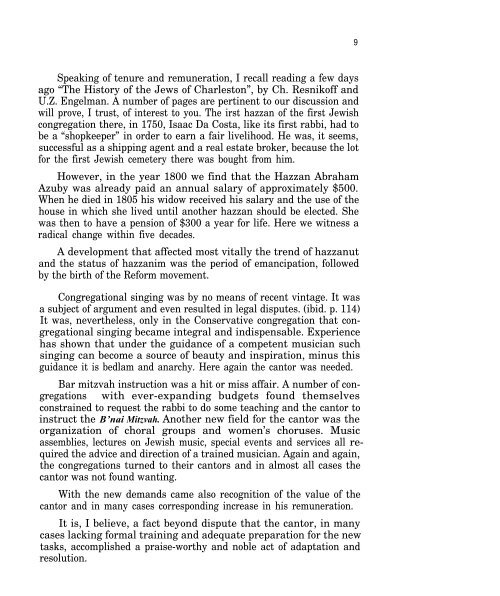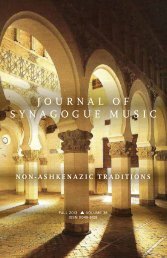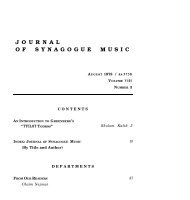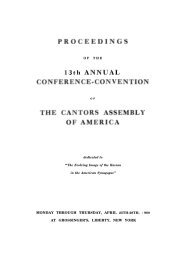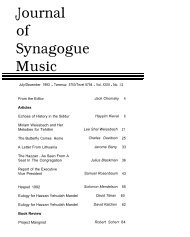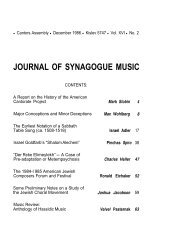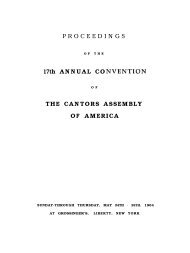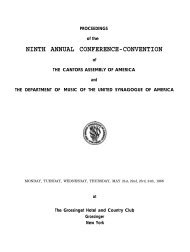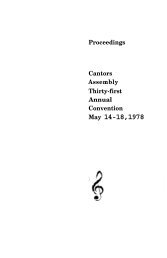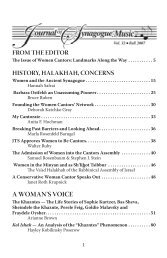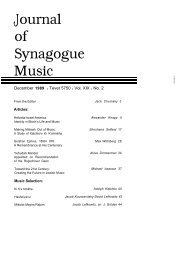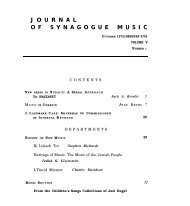Volume 7, Number 3 - Cantors Assembly
Volume 7, Number 3 - Cantors Assembly
Volume 7, Number 3 - Cantors Assembly
Create successful ePaper yourself
Turn your PDF publications into a flip-book with our unique Google optimized e-Paper software.
Speaking of tenure and remuneration, I recall reading a few days<br />
ago “The History of the Jews of Charleston”, by Ch. Resnikoff and<br />
U.Z. Engelman. A number of pages are pertinent to our discussion and<br />
will prove, I trust, of interest to you. The irst hazzan of the first Jewish<br />
congregation there, in 1750, Isaac Da Costa, like its first rabbi, had to<br />
be a “shopkeeper” in order to earn a fair livelihood. He was, it seems,<br />
successful as a shipping agent and a real estate broker, because the lot<br />
for the first Jewish cemetery there was bought from him.<br />
However, in the year 1800 we find that the Hazzan Abraham<br />
Azuby was already paid an annual salary of approximately $500.<br />
When he died in 1805 his widow received his salary and the use of the<br />
house in which she lived until another hazzan should be elected. She<br />
was then to have a pension of $300 a year for life. Here we witness a<br />
radical change within five decades.<br />
A development that affected most vitally the trend of hazzanut<br />
and the status of hazzanim was the period of emancipation, followed<br />
by the birth of the Reform movement.<br />
Congregational singing was by no means of recent vintage. It was<br />
a subject of argument and even resulted in legal disputes. (ibid. p. 114)<br />
It was, nevertheless, only in the Conservative congregation that congregational<br />
singing became integral and indispensable. Experience<br />
has shown that under the guidance of a competent musician such<br />
singing can become a source of beauty and inspiration, minus this<br />
guidance it is bedlam and anarchy. Here again the cantor was needed.<br />
Bar mitzvah instruction was a hit or miss affair. A number of congregations<br />
with ever-expanding budgets found themselves<br />
constrained to request the rabbi to do some teaching and the cantor to<br />
instruct the B’nai Mitzvah. Another new field for the cantor was the<br />
organization of choral groups and women’s choruses. Music<br />
assemblies, lectures on Jewish music, special events and services all required<br />
the advice and direction of a trained musician. Again and again,<br />
the congregations turned to their cantors and in almost all cases the<br />
cantor was not found wanting.<br />
With the new demands came also recognition of the value of the<br />
cantor and in many cases corresponding increase in his remuneration.<br />
It is, I believe, a fact beyond dispute that the cantor, in many<br />
cases lacking formal training and adequate preparation for the new<br />
tasks, accomplished a praise-worthy and noble act of adaptation and<br />
resolution.<br />
9


